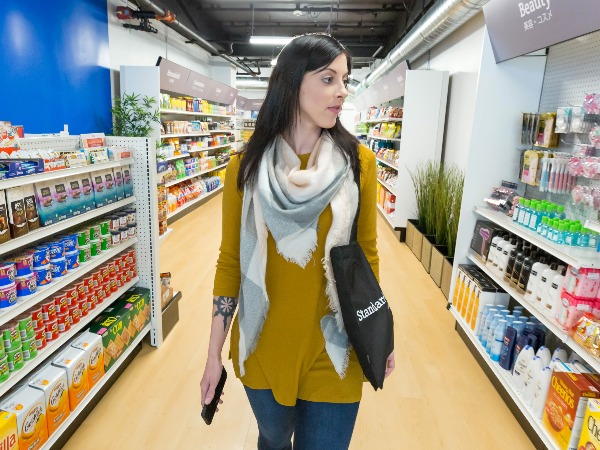

The retail apocalypse, as it is so often called, is already upon us, with more store closings in the first half of 2019 than in all of 2018. It’s a bloodbath, and many retailers won’t survive, at least not in their current form. Of course, that doesn’t tell the whole story; brick and mortar retail isn’t totally dead as even Amazon, the company most often blamed for the current problems in the retail landscape, has opened its own physical locations.
The thing that’s going to save the brick and mortar retailer is a focus on technology, and giving the customers a easier, better experience that will drive them back into the store.
Standard Cognition is one company on the front lines of that revolution, with technology that allows retailers to offer an autonomous checkout solution. Customers can pick up their items and leave the store without needing to ever take out any form of payment; instead, they are automatically charged for the items they take with them.
The company, which opened the first store of its kind in San Francisco last September, announced on Thursday that it raised a $35 million Series B funding round led by EQT Ventures, with participation from existing investors Initialized Capital, CRV and Y Combinator. The new round brings Standard’s total funding to date to more than $86 million, and values it at $535 million, a more than 2x increase over its valuation when it raised its Series A round in November 2018.
Launched in 2017, Standard Cognition allows customers to pay one of two ways: either have the Standard Cognition app, or the retailer’s app, which has their credit card on file. In the event that they don’t have an app or phone, or if they want to pay with cash, they’d be able to easily pay with a machine as they walk out. In either case, no objects would ever have to be taken out and individually scanned, making the checkout experience quicker and easier.
So far in 2019, the company has expanded its San Francisco cashierless store and rolled out credit/debit card payment capabilities in its autonomous checkout platform, with cash to come this summer, Michael Suswal, co-founder and COO of Standard Cognition, told VatorNews.
“There is a lot of action in this space, and we’re already seeing some of our early competitors fold. The backlash against cashless stores has been a big challenge for autonomous checkout companies, many of whom had no plan for accepting cash and whose technology won’t allow it. Fortunately, cash acceptance was one of Standard’s core principles from the start.”
The new funding will allow the company to double its 85 person team by the end of the year; it will be hiring in every area, but there will be a focus on adding both engineers and implementation experts.
The funding will also go towards allowing Standard Cognition to continue to focus its early customers in the U.S. and Japan. The company has so far signed contracts with two customers, one in Japan and one in the US., which combine for tens of thousands of stores. While it has only implemented in a handful so far, there are thousands more on the schedule before the end of the year.
“There is a huge appetite for autonomous checkout in Japan, partially because the country is so tech-forward but also because they have a huge labor shortage, so it’s really hard to hire cashiers. Furthermore, from a retail perspective, Japan has some of the highest retail store densities in the world which makes it an attractive market for Standard. We’ve found that Japanese retailers are very open to autonomous checkout. We want to take advantage of that and establish ourselves as the leader in that market,” said Suswal.
While a technology like Standard’s is designed to make the experience more convenient for the customer, this kind of technology also comes with potential issues, specifically around facial recognition and biometrics, something that Suswal openly acknowledges, but which he says Standard Cognition purposely avoids
“People are worried about privacy. Standard doesn’t use any biometrics at all, and we think vendors that do will have a hard time in the US, but more so internationally as some countries, like Japan, don’t allow facial recognition,” he said.
Another advantage that the company over some of its competitors is its “light footprint” which he said, “continues to be a huge advantage.”
“Retailers want systems that they can easily retrofit into existing stores and that can accommodate changing store layouts. Turnstiles and sensored shelves are expensive and inflexible.”
In addition, all the data that is collected by the cameras is stored on a computer in the back of the store, rather than on the cloud. As there’s no internet required to process the transaction, customers can check out anonymously and not have to depend on having a good internet connection to make sure their items are accurately counted.
Going forward, the company has plans to expanding to Europe, and it’s already talking with dozens of European retailers, especially in the UK. The company will have some help with that expansion now that Alastair Mitchell, Partner at Stockholm-based EQT Ventures, has joined the board of directors at Standard Cognition.
“Traditional brick and mortar retailers are caught in a perfect storm. From the encroachment of behemoths like Amazon into every inch of the market to changing consumer attitudes, as busy people demand an ever more efficient shopping experience, margins are being squeezed like never before,” Mitchell said in a statement.
“The talented and driven Standard Cognition team have worked quickly to build a product that allows physical retailers, of all sizes, to tackle these challenges. A strong track record, super-smart technology and bold ambitions for future expansion makes Standard Cognition an exciting investment for us, especially as we look to push forward with our ambition to help US companies break into Europe.”
“Standard is keen to expand into Europe, and that’s a big strength of EQT. They have deep knowledge of the various European markets, especially the UK which has been generally ahead of the curve when it comes to retail tech,” said Suswal.




















